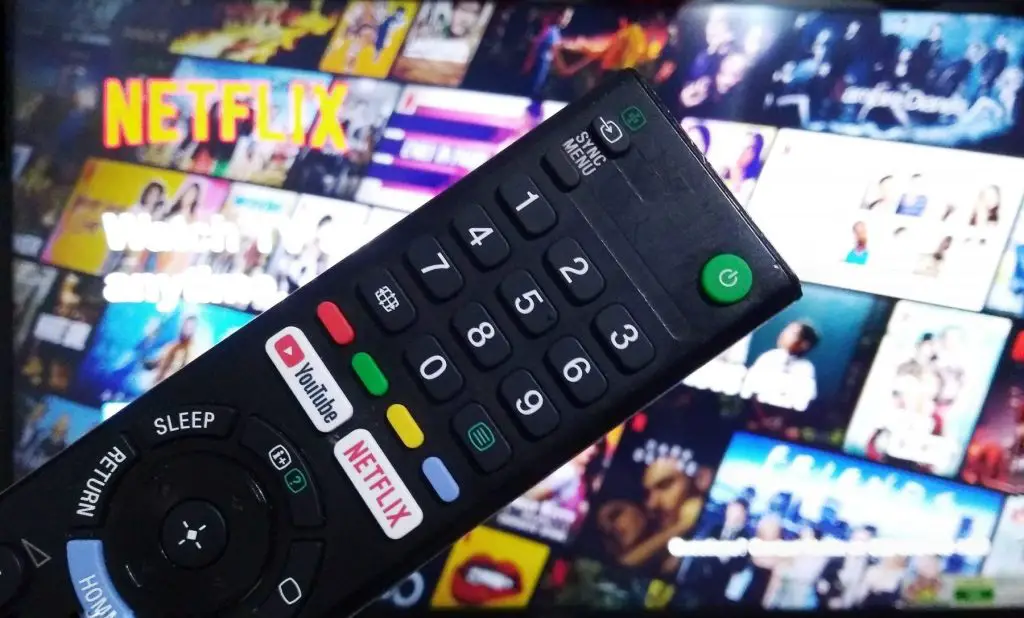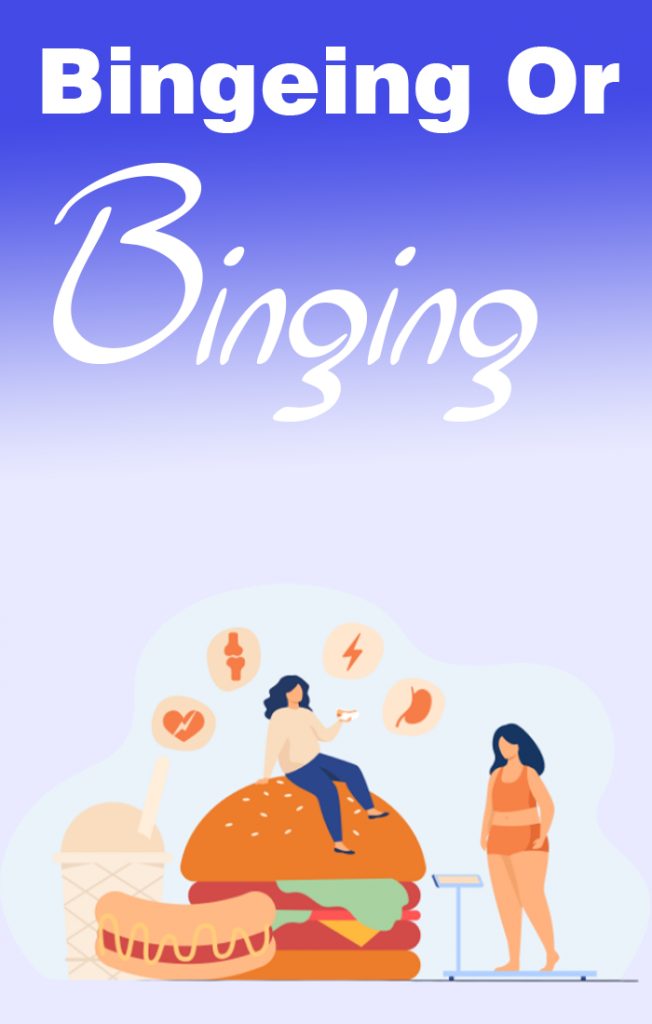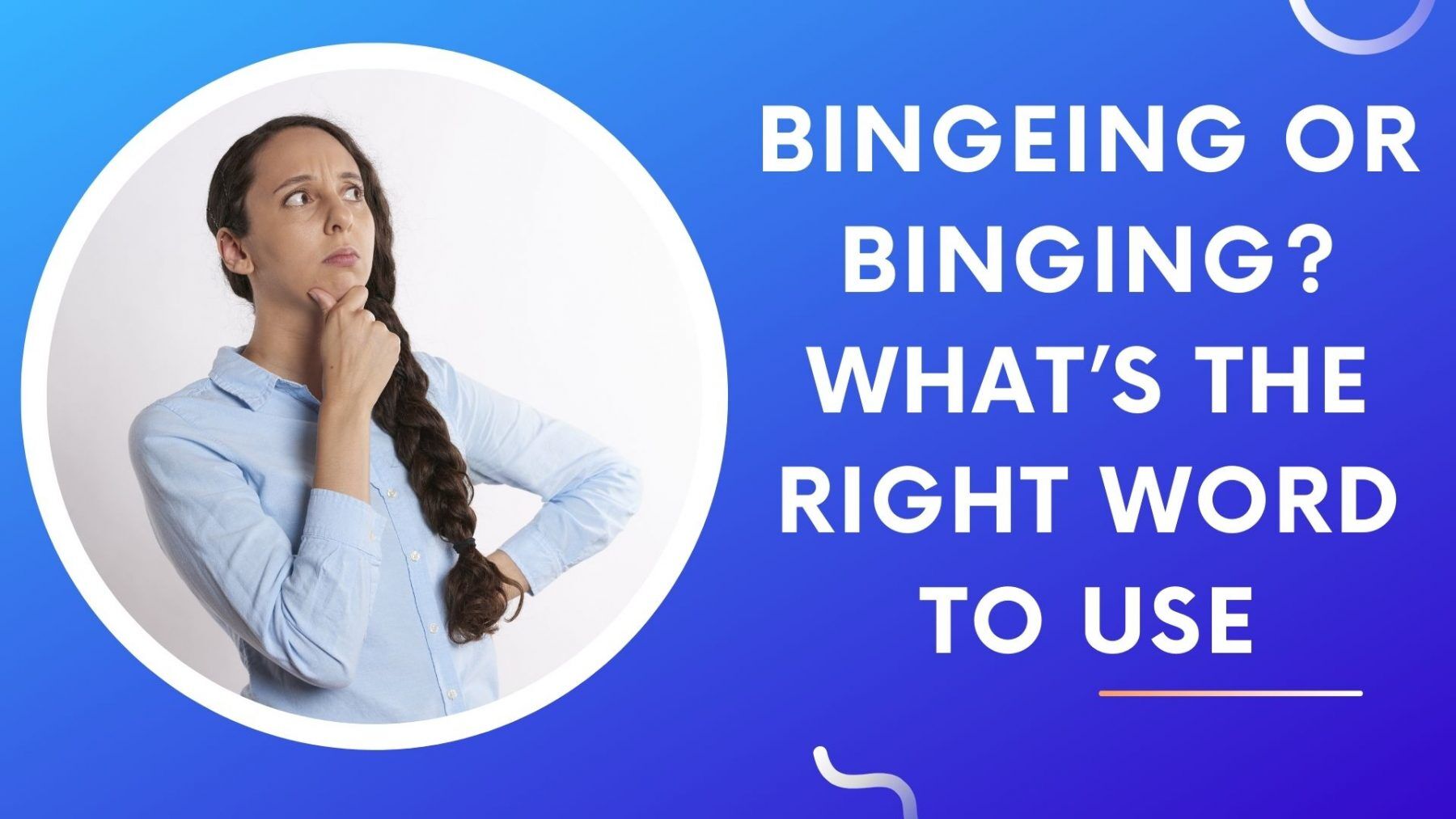The term “binge eating” has been around for quite some time.
Binge eating is defined as the consumption of large amounts of food in a short period of time and experiencing feelings of guilt after doing so.
In the 1980’s cultural awareness around binge eating as an ‘eating disorder’ became more popular.
As more people recognized and started to name their eating struggles, people began using the word ‘binge’ more frequently.
Over time, the spelling became popularized as ‘bingeing’.
I myself have never used ‘binging’ in my vocabulary. Ever since my wrestling days I’ve always thought of ‘bingeing’ with an e.
However, English is a tough language! There are future tenses, past tenses and words with weird spellings.
I recently compared bingeing versus bingeing and purging. Afterwards several people asked me …
“Is it bingeing or binging?”
Do you drop the ‘e’ or keep it?
In this article I’ll share why I believe you keep the ‘e’ and go with ‘bingeing’.
What Is Bingeing?
From Merriam Webster definition, a ‘binge’ is:
- a drunken revel : SPREE
- an unrestrained and often excessive indulgence, a buying binge
- an act of excessive or compulsive consumption (as of food), went on an eating binge or binge drinking
As you can see, the dictionary definition of ‘binge’ treats the term as a noun, and also doesn’t just refer to food.
Historical Popularity: Bingeing Versus Binging
As the above graph shows, only relatively recently people began using the word ‘binge’ more frequently as a verb. Before 1980, people only rarely used either ‘bingeing’ or ‘binging’.
(This graph comes from doing word compilations on digitized books using Google’s ngram viewer. This graph is not perfect! The results are limited to Google’s database. But the data is compelling nonetheless. For more info read here.)
Then in the 1980’s something shifted.
As you can see, around this time people started utilizing both ‘bingeing’ and ‘binging’ much more frequently as a verb.
- From 1800-1975 levels, where ‘bingeing’ made up .000001% of written words …
- To 2000 levels, where ‘bingeing’ made up .00002% of written words!
I know .000001 versus .00002 might seem insignificant …
But that’s actually 20x more often! That’s a 2000% increase in frequency in just 25 years!
What happened?
People Start Using Binge More
I believe in the 1980’s a combination of cultural forces collided.
For example, just think about how many things we can ‘binge’ today:
- Television shows
- Movies on Netflix
- Youtube videos

While streaming services like Netflix weren’t available back in the 1980’s, you can bet more Americans were getting TV sets and starting to ‘binge’ their favorite television channels. Radio, too, although that obviously was around a lot earlier!
There’s also been a huge educational shift in recognizing eating struggles such as yo yo dieting, weight regain and eating disorders.
Melainie Rogers, founder of the largest group nutrition therapy program in New York City, says back in the 1980’s there was hardly any awareness of eating disorders.
Now in 2020 when I interviewed Melainie on the Eating Enlightenment podcast, she says one of the biggest changes she’s seen over the years is the growing cultural recognition of eating disorders.
Dramatic Shifts In Cultural Awareness Towards Eating

Just in 2018 France passed the Lean Model Act.
This act is based on BMI, or Body Mass Index for short. The act specifies that if you’re a model and your BMI is too low, the modeling agency will face significant fines.
While there are many problems with BMI, this is nonetheless a great step in the right direction because it tries to address issues associated with body image and social media.
Can you imagine the likelihood of BMI-regulated modeling the 1980’s? The very idea would seem preposterous.
Yet now, admittedly 40 years later, things are really beginning to change.
We know the Lean Model Act has had an impact in France because there have been many initiatives trying to repeal it. It’s working because it’s pissing some people off!
Summary – Growing media consumption and awareness of eating disorders has increased vocabulary usage of ‘bingeing’.
Linguistically, Why Bingeing Over Binging?
Starting in the 1980’s, people ‘binge’ watched media more and there’s a growing recognition of eating disorders too. As a result, more people have been using the word ‘bingeing’.
But why not binging? Why the difference in spelling?
I did some research and found an article comparing words that end in e, like binge:
E gets dropped examples:
- Cringe > Cringing
- Springe > Springing
- Twinge > Twinging
Keep the E examples:
- Singe > Singeing
- Fringe > Fringeing
As you can see, from a technical linguistic point of view it doesn’t matter!
Sometimes you drop the E, other times you keep the E.
Now there probably is some sort of rationale as to which one to go with, but I’m an Eating Coach not a linguist.
I help people who struggle with overeating to stop overeating. I teach people how to journal, and through journaling to boost their discipline and awareness to make food peace.
Do you know why you crave certain foods like:
- Eggs
- Salt
- Ice
This means I have no idea about linguistic rules! I don’t know when a binge verb needs to drop the E!
If you want to learn more about linguistic rules, talk to a linguist.
Practically Speaking …
Just my two cents here …
But practically speaking I believe ‘bingeing’ makes much more sense.
‘Bingeing’ sounds like ‘binge’ + ‘ing’. Bingeing is very straightforward to pronounce and to read like it sounds.
However ‘binging’ to me sounds less clear and more open to interpretation.
Like you know the search engine Binge? The Microsoft equivalent of Google?
That’s pronounced BING!
Or even sometimes when I hear ‘bing’ I think of the sound a pebble makes when I’m driving and a pebble hits my windshield suddenly.
Bing!
Or a ‘ping’ pong ball that when smacked emits a ‘bing’ sound.
Now admittedly I’m just having fun here! But …
I think practically speaking it makes much more intuitive sense to keep the ‘E’ so there aren’t misunderstandings about sounds!
Finally, I’d also like to admit that whether you binge, bing, or just struggle with overeating it doesn’t make one damn bit of the difference how you spell these words.




